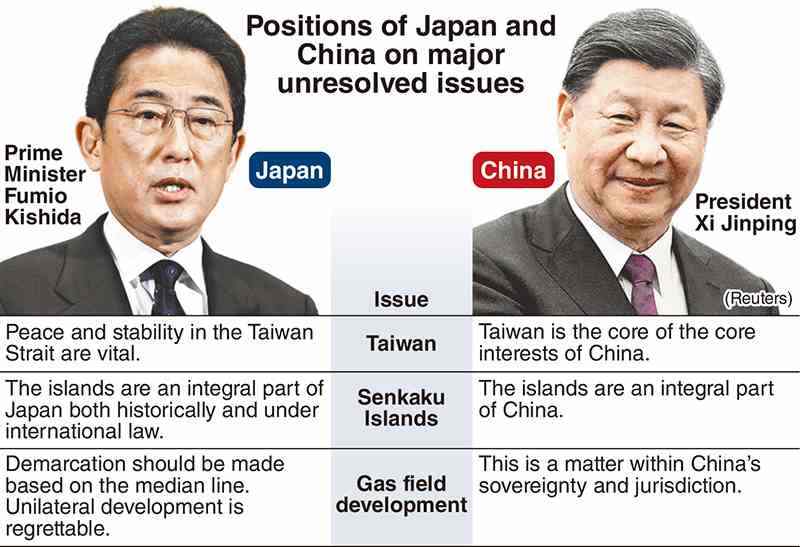
21:00 JST, November 18, 2022
BANGKOK — Prime Minister Fumio Kishida’s meeting with Chinese President Xi Jinping, the first official in-person meeting between leaders of the two nations in almost three years, was a first step toward repairing strained relations, but ironing out several major pending issues looks unlikely to happen anytime soon.
During their talks Thursday on the sidelines of the Asia-Pacific Economic Cooperation leaders meeting in Bangkok, Kishida and Xi agreed on the necessity of stably developing bilateral ties.
However, the road to improving relations, especially when concessions do not appear forthcoming on matters such as Taiwan and the Senkaku Islands in Okinawa Prefecture, could be long and bumpy.
Kishida put a positive spin on the talks, telling reporters afterward that the meeting was a “good start” for advancing dialogue to build a “constructive and stable” relationship between Japan and China.
In addition to directly telling Xi about Japan’s serious concerns over Chinese pressure on the Senkaku Islands and other issues, Kishida also emphasized the importance of maintaining peace and stability in the Taiwan Strait.
Kishida appeared proud that he had followed through on his publicly declared plan to “say what needs to be said.”
The two leaders saw eye-to-eye in opposing Russian use of nuclear weapons in Ukraine. Other fruits of the meeting included confirming efforts to maintain close and open communications, such as making arrangements for Foreign Minister Yoshimasa Hayashi to visit China.
There had been no face-to-face summit talks since then-Prime Minister Shinzo Abe met with Xi in December 2019, and bilateral ties had chilled in the meanwhile. “We’re finally at the start line for improving relations and avoiding confrontation,” a senior official of the Prime Minister’s Office said.
The wheels for making the Kishida-Xi talks a reality began turning on Aug. 17, when Takeo Akiba, secretary general of the National Security Secretariat, met with Yang Jiechi, China’s top diplomat and a then member of the Chinese Communist Party’s Politburo, in Tianjin, China.
According to Foreign Ministry sources, Akiba informed Yang during a meeting that lasted for almost seven hours that Kishida was prepared to engage in talks, even though there was “a risk of criticism from conservative circles.” Yang reportedly welcomed the idea.
In early August, Beijing showed its displeasure to the visit by U.S. House of Representatives Speaker Nancy Pelosi to Taiwan by conducting military drills around the island. The Chinese fired five ballistic missiles that fell within Japan’s exclusive economic zone, and scheduled talks between the Japanese and Chinese foreign ministers were shelved.
While it appeared that channels for dialogue had been severed, Akiba and Yang reaffirmed in their meeting that bilateral talks would continue. In the following months, the groundwork for the Kishida-Xi talks was carefully cultivated, with Xi even sending Kishida his message of sympathy when the Japanese leader contracted the novel coronavirus in August.
Conducting summit talks in conjunction with an international meeting in a third nation in Southeast Asia lessened the burden on both sides. China informed Japan about a week before the APEC meeting in Thailand that the bilateral talks would go ahead.
U.S. presence
Although the summit talks took place, a full-scale “thaw” in relations — such as resolving pending bilateral issues — remains a long way off.
During U.S.-China summit talks held on the Indonesian island of Bali on Monday, U.S. President Joe Biden and Xi traded blunt comments over Taiwan. At a time when the United States, Japan’s close ally, remains locked in a staredown with China, it becomes difficult for Kishida to exhibit a reconciliatory stance toward Beijing.
Further complicating the situation, the Liberal Democratic Party faction Kishida heads has traditionally been seen as friendly toward China.
This leaves any attempts to build warmer ties with Beijing vulnerable to pushback from domestic conservative forces.
During the East Asia Summit held in Cambodia on Sunday, Kishida mentioned China by name in criticizing activities “continuing and intensifying in the East China Sea that infringe on Japan’s sovereignty.” This was all said with Chinese Premier Li Keqiang in attendance.
It seems Kishida is going to pains to strike a balance between reaching out to Beijing and staying keenly aware of domestic public opinion on China’s actions.
Top Articles in Politics
-

Japan PM Takaichi’s Cabinet Resigns en Masse
-

Sanae Takaichi Elected Prime Minister of Japan; Keeps All Cabinet Appointees from Previous Term
-

Japan’s Govt to Submit Road Map for Growth Strategy in March, PM Takaichi to Announce in Upcoming Policy Speech
-

LDP Wins Historic Landslide Victory
-

LDP Wins Landslide Victory, Secures Single-party Majority; Ruling Coalition with JIP Poised to Secure Over 300 seats (UPDATE 1)
JN ACCESS RANKING
-

Producer Behind Pop Group XG Arrested for Cocaine Possession
-

Japan PM Takaichi’s Cabinet Resigns en Masse
-

Japan Institute to Use Domestic Commercial Optical Lattice Clock to Set Japan Standard Time
-

Man Infected with Measles Reportedly Dined at Restaurant in Tokyo Station
-

Israeli Ambassador to Japan Speaks about Japan’s Role in the Reconstruction of Gaza






















